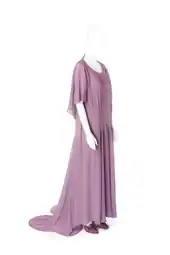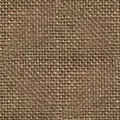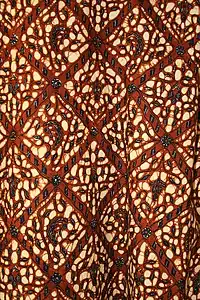Crêpe (textile)
Crêpe, also spelt crepe or crape (from the French crêpe[1]), is a silk, wool, or synthetic fiber fabric with a distinctively crisp and crimped appearance. The term crape typically refers to a form of the fabric associated specifically with mourning.[2] Crêpe was also historically called crespe or crisp.[3]
_LACMA_41.11.8.jpg.webp)
Woman's mourning bonnet in hard crape, c.1880
Types
Types (A to C)
.jpg.webp)
Detail of an aerophane dress, c.1827
- Aerophane:
- Crimped silk gauze with a crêpe texture.
- An historic 19th century lightweight crêpe,[4] introduced in 1820,[5] and, as crepe aerophane in 1861.[6]
- Albert crêpe:
- A superior-quality black silk mourning crêpe used since 1862.[5]
- Plain-weave crêpe.
- An English-made silk and cotton blend crêpe.[7]
- Alicienne: A furnishing fabric with alternating plain weave and crêpe stripes.[8]
- Alpaca crêpe: Rayon and acetate blend crêpe with a woollen texture, not necessarily made of alpaca yarn.[8]
- Altesse: A British plain-weave silk fabric with crêpe filling.[9]
- Arabian:
- A British-made plain-weave cloth with figured crêpe designs
- Piece-dyed silk crêpe embroidered with dots.[10]
- Armure See Georgian crêpe.
- Balanced crêpe: Crêpe woven with alternating S and Z twist yarns in both directions.[11]
- Balmoral crape: An 1895 English crape.[12]
- Balzerine: An 1889 narrow-striped silk grenadine overlaid with wider crêpe stripes. An earlier 1830s cotton/worsted fabric, spelled balzarine, is probably not crêpe.[12]
- Bark (or tree-bark) crêpe: A broad term describing rough crêpes with a bark texture.[13][14]
- Bauté satin: Warp-woven satin with a plain crêpe reverse.[15]
- Borada crape: A cheaper, economical version of mourning crape advertised in c.1887.[3]
- Bologna crêpe: Silk crêpe used for mourning, also known as valle cypre.[16]
- Canton crêpe: A soft silk crêpe with a pebbly surface originally associated with Canton in China, with bias ribs. Made in Britain, but exported to China, hence its name.[17]
- Caustic soda crêpe: Cotton treated with chemicals to create a crêpe-like texture, often in patterns.[18]
- Chiffon crêpe: Chiffon-weight crêpe.[19]
- Chijimi: Japanese crêpe.[19]
_of_rayon.jpg.webp)
Chirimen
- Chirimen: Japanese raw silk crêpe widely used to make kimono.[20][21] When woven with a dot it is mon-chirimen.[22][23]
- Courtauld crape: 1890s mourning crape made by Courtaulds. An 1894 variation, called Courtauld's new silk crêpe, was exceptionally thin and soft.[6] Courtaulds monopolised the export market for English crapes and crêpes, meaning that the textiles known as crape anglaise were almost always manufactured by Courtaulds up until 1940.[3]
- Crêpe Algerian: A trade name for a printed pongee with a rough crêpe texture.[24]
- Crêpe anglaise: A French term for English mourning crapes in black and white.[6] The only true 'crape anglais' was considered that made by Courtaulds (see Courtauld crape) which was last made in 1940.[3]
- Crêpe Beatrice: Trade name for crêpe with a light warp stripe.[24]
- Crêpe berber: Trade name for a piece-dyed crepe-textured pongee.[25]
- Crêpe charmeuse: Lightweight silk satin with a grenadine warp and crêpe reverse.[25]
- Crêpe chenette: A tradename for a strong crêpe with a pebble texture.[25]
- Crêpe crêpe: Made with extra twists in the warp to create an extra-deep texture.[25]

Crepe de chine
- Crêpe de chine: A fine, lightweight silk, cotton, or worsted, with a plain weave and crêpe-twist filling.[25]
- Crêpe de chine travers: A ribbed crêpe de chine with heavier filling yarns introduced to the weave at regular intervals.[25]
- Crêpe de dante: Crêpe with silk and wool filling.[25]
- Crêpe de lahor: Cotton crêpe made in France.[25]
- Crêpe de laine: A sheer wool fabric plain-woven with hard twist for a slight crêpe effect.[25]
- Crêpe de santé: An undyed, closely woven, rough-textured wool-blend crêpe mixed with silk, linen or cotton, also called "health crepe"[25]
- Crêpe de Suisse: 1860 dress fabric.[6]
- Crêpe d'espagne: Open-weave fabric with a silk warp and wool filling.[25]
- Crêpe diana: Trade name for a cotton and silk blend crêpe.[25]
- Crêpe Elizabeth: English term for a mottled or pebbled georgette.[25]
- Crêpe faille sublime: Silk grosgrain with a hard-twist filling.[25]
- Crêpe flannel: Plain-woven worsted with a crêpe finish.[25]
- Crêpe imperial Late 19th century woollen crape.[6]
- Crêpe jacquard: Crepe with designs produced by jacquard weaving.[25]
- Crêpe janigor: Trade name for a heavy rib textile with alternating rayon and dull acetate warp threads, cross-dyed for varied shades.[25]
- Crêpe jersey: Vertically ribbed silk crêpe resembling the knit fabric.[25]
- Crêpe lissé (or lease): A lightweight, lustrous, slightly stiffened open-weave silk or cotton crêpe, with fewer twists than a crêpe crêpe.[25]
- Crêpela: French term for a crêpe effect.[25]
- Crepeline: Very sheer plain-woven silk usually used in textile conservation.[25] Originally introduced in the 1870s as a cheap alternative to crepe de chine.[6]
- Crêpella: Plain-woven worsted using hard-spun yarn.[25]
- Crêpe maretz An 1862 fabric.[6]
- Crêpe marocain: Heavy, cross-ribbed crêpe where the filling yarn is coarser than the warp, resembling a canton crêpe.[25]
- Crêpe meteor: Soft silk crêpe, twill weave reversing to satin.[25]
- Crêpe mohair: Silk and mohair blend crêpe.[25]
- Crêpe morette: Trade name. Lightweight worsted crêpe with heavier, looser filling.[25]
- Crêpe mosseux: A type of opaque voile which resists shrinkage.[25]
- Crêpe myosotis A later mourning crêpe made in the 1930s, in crimped silk with a soft finish.[6] Courtaulds launched this textile in the early 1930s as an alternative to the increasingly unpopular traditional stiff mourning crapes.[3]
- Crepenette: Crêpe-effect pongee.[25]
- Crêpe ondese: Rough textured rayon-acetate blend crêpe.[25]
- Crêpe poplin: A late 19th century silk-wool rib fabric with crêpe effect.[25]
- Crêpe rachel: French print cotton-worsted blend crêpe.[25]
- Crêpe radio: British raw silk crêpe with a ribbed effect, using alternate double rows of S-twist and Z-twist.[25]
- Crêpe royal: Sheer crêpe-de-chine introduced in 1889.[6]
- Crêpe suzette: A variation on crepon georgette.[25]
- Crepine: Silk with crêpe dots. The name also describes a type of fringe.[25]
- Crepoline: A class of transparent fabrics with a warp-wise crêpe effect.[25]
- Crepon: A heavier crêpe with an exaggerated warp-directional texture produced by several weaving techniques.[25] A soft silky version was introduced in 1866, and the second, much heavier version in 1882. In the 1890s crepon also described a woollen fabric that puffed between stripes or squares, including crepon milleraye (striped) and crepon Persian (with 'Oriental patterns').[6]
- Crystal crêpe: An English term for silk crêpe.[26]
- Crespe: Lightweight crimped mourning gauze, late 16th century.[6]
- Cynara: An crêpe-type fabric in rayon and acetate.[27]
- Cyprus: Fine crêpe used for mourning hatbands in the 15th-17th centuries, made in Cyprus.[28]
Types (E to L)
- 'ele'ele kanikau: Black mourning crêpe worn in Hawaii.[29]
- Epingline: Textile in silk, rayon or worsted with a crêpe surface.[30]
- Esmeralda or étendelle: Sheer white crêpe or gauze popular in the early 19th century, often embroidered.[31]
- Flat crêpe: Also called mock crepe or (inaccurately) French crepe. A smooth, flat plain-weave fabric, typically a silk blend, with hard-twisted yarns and ordinary yarn warp. Also used to describe a similar fabric made without crepe-twist yarns.[32]
- French crêpe: Inaccurately applied to flat crêpe.
- Plain-weave light silk or rayon cloths similar to flat crêpe.
- A lingerie weight fabric with ordinary yarn warp and a twisted filling yarn that is less twisted than typical crepe twist.[33]
- Gamsa: An imitation satin-backed crêpe in twill weave rayon.[34]

Georgette evening dress, 1930s
- A crepe-surfaced plain weave silk or synthetic fabric with alternating S and Z twist yarns in both warp and weft.
- An English term for cotton crepe.[36]
- Georgian crêpe: A chain-pebbled crêpe (called armure in France) often with diamond, shield or bird's-eye motifs.[36]
- Health crêpe: See crêpe de santé.
- Lingerie crêpe: See French crêpe.
Types (M to Y)
- Marana: Woollen crepe, very resilient and drapable.[37]
- Mock crêpe: See flat crêpe
- Momie crêpe: Light cotton fabric.[22]
- Moss crepe: See sand crepe
- Norwich crêpe or crape:
- 19th century silk warp and worsted, resembling a non-twill bombazine but not considered true crêpe.
- 17th century black-dyed worsted crêpe made in England.
- A georgette-like silk and cotton blend fabric in a crêpe weave.[3][38]
- Pekin crêpe: Pekin (shiny and matte striped textile) woven with a crêpe weft.[39]
- Plissé: Mainly cotton fabric with a crêpe effect created by chemically treating the fabric to pucker and crinkle, typically in stripes. Plissé satin is made using crêpe yarns.[40]
- Reverse crêpe: Woven with a crêpe yarn warp and flat filling.[41]
- Rhythm crêpe: Plain-weave rayon with seersucker stripe.[42]
- Romaine: Heavy but transparent crêpe.[43]
- Roshanara: Trade name for heavily ribbed satin-backed crepe.[44]
- Russian crêpe: Invented in 1881. A coarse-weave crêpe.[45]
- Sand crepe or moss crepe: Crêpe with a grained or frosted surface appearance, created with a small dobby weave.[46]
- Sawdust crêpe: Similar to sand crêpe but with a harsher surface.[47]
- Satin-back crêpe: Reversible fabric with a satin face and a crêpe reverse.[24]
- Shioze: Japanese spun-silk crêpe.[48]
- Spanish crêpe: See d'espagne.
- Victoria crepe: British-made cotton crêpe with a high lustre.[49]
- Yantsou: Figured silk crêpe made in Yantai, Eastern China.[50]
- Yeddo crêpe: Soft cotton fabric, medium weight.[51]
See also
- Crêpe paper, paper with similar texture
References
- Online Etymology Dictionary
- Dictionary.com
- Taylor, pp. 246-253
- Tortora & Johnson, p. 6
- Lewandowski, p.6
- Lewandowski, p.77
- Tortora & Johnson, p.10
- Tortora & Johnson, p. 14
- Tortora & Johnson, p.14
- Tortora & Johnson, p. 23
- Tortora & Johnson, p.39
- Lewandowski, p. 22
- Lewandowski, p. 25
- Tortora & Johnson, p.45
- Tortora & Johnson, p. 52
- Tortora & Johnson, p. 66
- Tortora & Johnson, p. 96
- Tortora & Johnson, p. 52
- Lewandowski, p. 52
- Ikegami, p.276
- Panda, p.92
- Lewandowski, p. 194
- https://visitkyotango.com/about/#about-chirimen
- Tortora & Johnson, p. 156
- Tortora & Johnson, p. 157
- Tortora & Johnson, p. 164
- Tortora & Johnson, p. 168
- Lewandowski, p. 81
- Lewandowski, p. 96
- Lewandowski, p. 99
- Tortora & Johnson, p. 215
- Tortora & Johnson, p. 236
- Tortora & Johnson, p. 247
- Tortora & Johnson, p. 254
- Picken, Mary Brooks (1957). A Dictionary of Costume and Fashion: Historic and Modern. Courier Corporation. pp. 88. ISBN 9780486402949.
- Tortora & Johnson, p. 259
- Tortora & Johnson, p. 372
- Tortora & Johnson, p. 418
- Lewandowski, p. 224
- Tortora & Johnson, p. 465
- Tortora & Johnson, p. 509
- Tortora & Johnson, p. 510
- Lewandowski, p. 252
- Tortora & Johnson, p. 517
- Lewandowski, p. 254
- Tortora & Johnson, p. 527
- Tortora & Johnson, p. 536
- Tortora & Johnson, p. 555
- Tortora & Johnson, p. 664
- Tortora & Johnson, p. 693
- Tortora & Johnson, p. 695
Bibliography
- Ikegami, Eiko (2005). Bonds of civility : aesthetic networks and political origins of Japanese culture (Reprinted ed.). Cambridge: Cambridge University Press. ISBN 9780521601153.
- Lewandowski, Elizabeth J. (2011). The complete costume dictionary. Lanham, Md.: Scarecrow Press, Inc. ISBN 9780810877856.
- Panda, H. (2010). The complete book on textile processing and silk reeling technology (First ed.). Delhi: Asia Pacific Business Press, Inc. ISBN 9788178331355.
- Taylor, Lou (2009) [1983]. "Appendix 1: A Selection of Popular Mourning Fabrics". Mourning Dress: A Costume and Social History (2009 ed.). Routledge Revivals. pp. 246–253. ISBN 978-1135228439.
- Tortora, Phyllis G.; Johnson, Ingrid (2014). The Fairchild books dictionary of textiles (8th ed.). New York: Fairchild Books. ISBN 9781609015350.
This article is issued from Wikipedia. The text is licensed under Creative Commons - Attribution - Sharealike. Additional terms may apply for the media files.


.svg.png.webp)